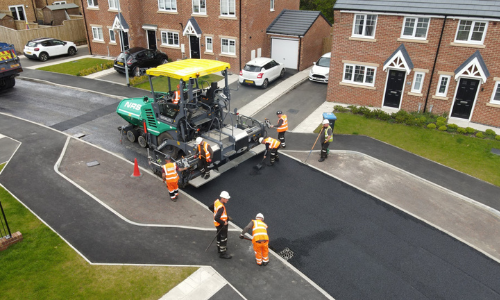
Surfacing using tarmac material and block paving for your driveway have the potential to be excellent possibilities not only for a more safe driveway for your car but also resurfaced driveways through tarmac surfacing contractors can often raise the market value of the home.
Still, before you decide on which of the two is right for you, it’s essential to understand the differences. You may be surprised at how different these two methods of paving are. And how much they cost.

Permeable asphalt
When comparing a permeable asphalt driveway vs block paving, you must consider the different installation techniques and materials. In addition, permeable paving systems have to be maintained to keep them in good shape.
Permeable pavements can be used for residential and commercial drives, paths, and parking lots. They can also help in stormwater management.
However, they need to be installed and maintained in a way that does not detract from their hydrologic function. For example, pervious paving systems can eventually become clogged and need to be cleaned.
Permeable pavement is inappropriate for high pollutant loading sites, such as where fuels and chemicals are stored. These sites receive a constant stream of sediment, trash, and debris.
One of the significant disadvantages of porous pavements is that they cannot pretreat stormwater before infiltration. This means that the paving system can become contaminated with groundwater contaminants. To prevent this, cleaning the surface twice a year is important.
Resin Bound
If you are thinking of replacing your old tarmac or block paved driveway with a more modern surface, many options are available. Choosing the suitable surface is essential for several reasons. Aside from its aesthetic appeal, a good quality surface will also provide better traction for your car, making it easier to drive.
A resin-bound tarmac is an excellent option if you want a driveway that will last for years and years. It is also relatively affordable, which is why more and more homeowners opt for it.
The best part is that it’s simple to install. No costly ground works are required, and the finished product is ready to use the same day. You can even overlay it over an existing surface, which is a great way to save on the expense of a new driveway.
Besides the aesthetic value, resin-bonded paving has the advantage of being low maintenance. It is easy to clean and requires very little time and money to maintain.
Pea gravel
Choosing the best material for your needs will depend on many factors, including your budget for material and tarmac surfacing contractors in addition to your individual preferences. Generally speaking, tarmac remains the cheapest option for resurfacing needs.
The best part about tarmac is that it is easy to install and requires no additional maintenance. This type of surface is ideal for wheelchairs and an excellent choice for large areas.
Tarmac surfacing is durable and can last up to fifteen years without extra maintenance. However, it can release dangerous chemical pollutants into the air. That’s why you should look into the other options.
One alternative is gravel. A gravel driveway is a low-maintenance and cost-effective option. You can choose from a variety of colours. These include pea gravel and different sizes of stones. Pea gravel is a good choice for a decorative garden area.
Cost
If you are in need of driveway paving, you have a few options. You can use tarmac, block paving, and gravel. While the costs are similar, your choice may depend on your budget and what you want.
Tarmac surfacing is an affordable option that can last for up to 15 years. This makes it a popular choice for homeowners who are looking to improve the look of their driveway.
Block paving is durable and has a natural aesthetic appeal. However, it can be a more expensive material than tarmac. It can also require ongoing maintenance, so you should consider that before you make your choice.
Asphalt, on the other hand, offers better durability and cost efficiency. In addition, it is more environmentally friendly. On average, concrete or asphalt driveways can last for up to 30 years. However, the lifespan can be as long as 75 years in warm climates.
In addition to the material, you’ll need to account for labour costs. The time it takes to pave your driveway will vary depending on its size and complexity. Some projects take less than a day, while others can take up to four or five days.

Sophie covers topics related to cosmetic procedures, skincare routines, and overall health, promoting informed choices.
